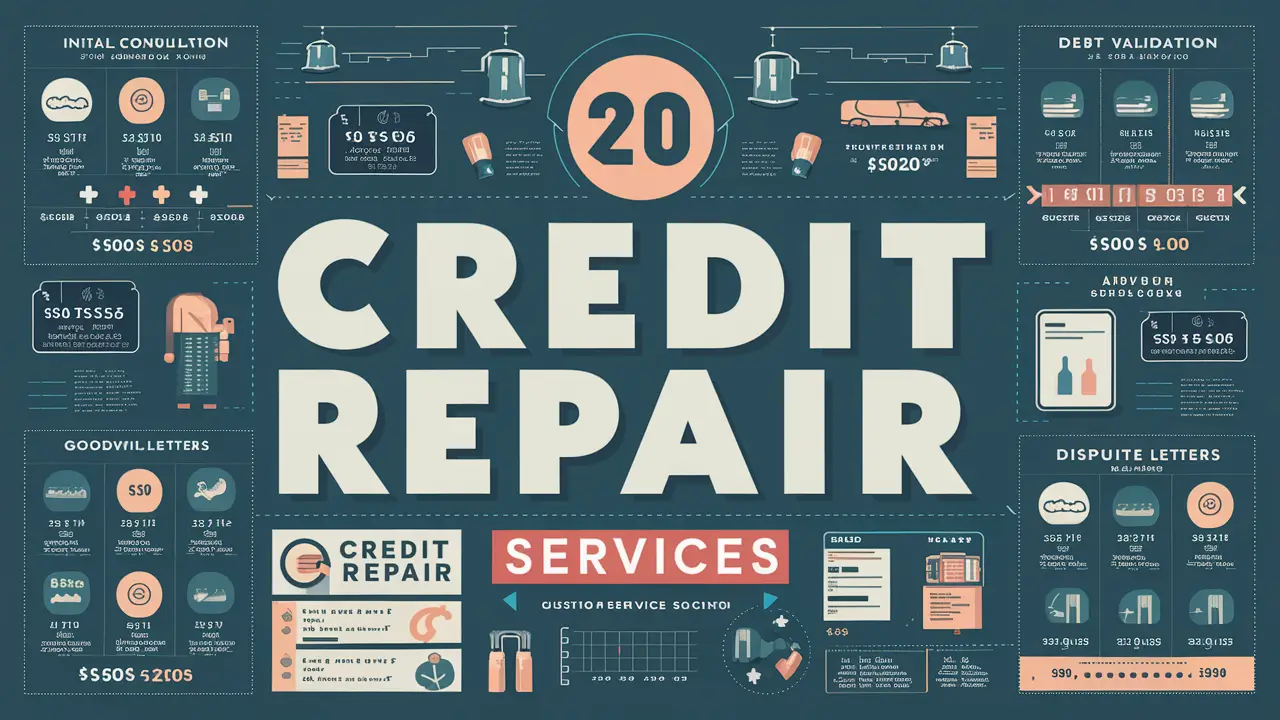-
Posted on: 25 Jul 2024

-
Your credit score plays a vital role in your financial life, influencing everything from loan interest rates to approval for housing and employment. When your credit score is less than ideal, it can be tempting to seek professional help from credit repair companies. But before you sign up, it's crucial to understand the costs involved. This comprehensive guide breaks down the pricing structures of credit repair services, helps you evaluate the value you might receive, and offers insights into whether professional help is the right choice for you.
Understanding Credit Repair Services
Credit repair services aim to improve your credit score by identifying and challenging inaccurate, outdated, or unverifiable negative information on your credit reports. This can include items like late payments, charge-offs, collections accounts, and even bankruptcies (within the reporting time frame). Reputable credit repair companies will work on your behalf to dispute these items with the credit bureaus (Experian, Equifax, and TransUnion) and creditors.
It's important to understand that credit repair companies cannot legally remove accurate and verifiable negative information from your credit report. Their services are primarily focused on correcting errors and ensuring the accuracy of your credit history.
Important Note: Be wary of any credit repair company that guarantees specific results or asks for upfront payment before providing any services. This is a red flag and may indicate a fraudulent operation. The Credit Repair Organizations Act (CROA) protects consumers from unfair and deceptive practices.Common Credit Repair Pricing Models
Credit repair companies typically use one of several pricing models. Understanding these models is key to comparing costs and determining the best option for your needs:
1. Monthly Retainer Fees
This is one of the most common pricing structures. You pay a fixed monthly fee for the duration of your credit repair service. The fee typically ranges from $50 to $150 per month. The services included in the monthly fee can vary but generally cover:
- Credit report analysis
- Dispute letter preparation and mailing
- Communication with credit bureaus and creditors
- Ongoing credit monitoring (sometimes)
- Progress updates
Pros: Consistent and predictable costs. Often includes a wide range of services.
Cons: You pay the monthly fee regardless of whether any negative items are successfully removed from your credit report. Can become expensive over time if the process takes several months.
2. Per-Item Fees
With this model, you pay a fee for each negative item successfully removed or corrected on your credit report. The fee per item can range from $50 to $200 or more. Often, there is an initial setup fee in addition to the per-item charges.
Pros: You only pay for results. This can be a good option if you only have a few specific negative items you want to address.
Cons: Can be difficult to predict the total cost. May incentivize the credit repair company to focus on easy-to-remove items rather than the most impactful ones. Requires careful tracking to ensure you are only charged for successful removals.
3. First Work Fee/Setup Fee + Monthly Fee
This model combines an upfront "first work fee" or setup fee (typically ranging from $50 to $200) with a lower monthly retainer fee. The initial fee covers the initial credit report analysis and dispute letter preparation.
Pros: Lower monthly costs after the initial setup. Can be a good compromise between a purely monthly retainer and a per-item fee.
Cons: Requires an upfront payment before seeing any results. The total cost can still be significant over time.
4. Performance-Based Fees (Rare and Often Questionable)
While less common, some companies may offer performance-based fees, where you only pay if your credit score improves by a certain amount. However, this model is often associated with scams or misleading practices, as credit repair companies cannot directly control your credit score. Be extremely cautious if you encounter this pricing structure.
5. "Free" Consultation and Then a Paid Service
Many credit repair companies offer a free consultation to review your credit report and discuss potential services. While the consultation is free, be prepared for a sales pitch and a proposal for a paid service package. Use the consultation as an opportunity to ask questions, understand the company's approach, and get a clear breakdown of the costs.
Factors Influencing Credit Repair Costs
The total cost of credit repair can vary depending on several factors:
- The number of negative items on your credit report: The more items that need to be disputed, the more time and effort will be required, and the higher the cost may be.
- The complexity of the issues: Some credit report errors are simple to correct, while others require more extensive investigation and communication with creditors. Complex issues may increase the cost.
- The company's pricing structure: As discussed above, different pricing models can significantly impact the overall cost.
- The length of the service: Credit repair is not a quick fix. It can take several months or even longer to see significant improvements. The longer the service lasts, the more you will pay, especially with monthly retainer fees.
- The geographic location of the company: Companies in areas with higher costs of living may charge more for their services.
- The specific services included in the package: Some companies offer more comprehensive services than others, such as credit monitoring, debt validation, and cease and desist letters to collection agencies. These additional services may increase the cost.
Hidden Costs and Potential Scams
Be aware of potential hidden costs and red flags that may indicate a credit repair scam:
- Upfront fees before any services are provided: This is illegal under the Credit Repair Organizations Act (CROA).
- Guarantees of specific results: No credit repair company can guarantee that they will be able to remove specific negative items from your credit report or that your credit score will improve by a certain amount.
- Requests to create a new credit identity: This is illegal and can lead to serious legal consequences.
- Lack of transparency about fees and services: A reputable credit repair company will clearly explain their pricing structure and the services they provide.
- Pressure to sign up immediately: Legitimate companies will not pressure you into making a quick decision.
- Unrealistic promises: Be wary of companies that promise to erase all your debt or drastically improve your credit score in a short period of time.
Always research the credit repair company thoroughly before signing up for their services. Check their reputation with the Better Business Bureau (BBB) and read online reviews. Make sure the company complies with the Credit Repair Organizations Act (CROA) and provides you with a written contract that clearly outlines the services they will provide and the fees you will be charged.
DIY Credit Repair: A Cost-Effective Alternative
Before hiring a credit repair company, consider the possibility of repairing your credit yourself. While it requires time and effort, DIY credit repair can be a cost-effective alternative. The process involves:
- Obtaining copies of your credit reports from all three major credit bureaus: You can get a free copy of each report annually from AnnualCreditReport.com.
- Reviewing your credit reports carefully and identifying any errors or inaccuracies: Look for incorrect personal information, accounts that don't belong to you, and inaccurate reporting of payment history.
- Disputing the errors with the credit bureaus: You can submit disputes online or by mail, providing supporting documentation to back up your claims.
- Following up with the credit bureaus and creditors: Keep track of your disputes and follow up to ensure they are being investigated.
There are numerous resources available online to guide you through the DIY credit repair process, including sample dispute letters and tips for communicating with credit bureaus and creditors.
Advantages of DIY Credit Repair:
- Cost-effective: You only pay for the cost of postage or online dispute filing, if any.
- Full control: You have complete control over the process and can track your progress closely.
- Educational: You gain a better understanding of your credit report and how credit scoring works.
Disadvantages of DIY Credit Repair:
- Time-consuming: It requires significant time and effort to review your credit reports, prepare dispute letters, and follow up with the credit bureaus.
- Can be confusing: Navigating the credit repair process can be complex, especially if you are unfamiliar with credit laws and regulations.
- May not be as effective as professional help in some cases: Credit repair companies may have more experience and expertise in dealing with credit bureaus and creditors.
Is Credit Repair Right for You?
Deciding whether to hire a credit repair company is a personal decision. Consider the following factors:
- Your budget: Can you afford the cost of credit repair services?
- Your time and resources: Do you have the time and resources to repair your credit yourself?
- The complexity of your credit issues: Are you dealing with complex credit errors that require specialized knowledge?
- Your comfort level: Are you comfortable disputing errors with credit bureaus and creditors yourself?
If you are comfortable with the DIY approach and have the time and resources to dedicate to it, you may be able to repair your credit yourself without hiring a professional. However, if you are overwhelmed by the process or are dealing with complex credit issues, a credit repair company may be a worthwhile investment.
Alternatives to Credit Repair
Before pursuing credit repair, consider these alternative strategies to improve your credit score:
- Pay your bills on time: Payment history is the most important factor in your credit score.
- Keep your credit card balances low: Aim to keep your balances below 30% of your credit limit.
- Don't open too many new credit accounts at once: Opening multiple accounts in a short period of time can lower your credit score.
- Become an authorized user on a credit card with a good payment history: This can help you build credit without having to open your own account.
- Consider a secured credit card: Secured credit cards require a security deposit, but they can be a good option for people with bad credit.
Top Credit Repair Companies (Examples - Do Your Own Research)
If you decide to hire a credit repair company, research several options carefully before making a decision. Some popular companies include (but this is not an endorsement and you should conduct your own due diligence):
- Lexington Law: Known for its extensive legal experience and aggressive dispute strategies.
- Credit Saint: Offers a money-back guarantee and personalized service.
- Sky Blue Credit: Provides a simple and straightforward pricing structure.
Remember to compare prices, services, and customer reviews before choosing a credit repair company. Always read the fine print and understand the terms and conditions of the service agreement.











